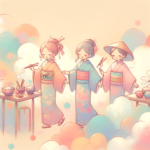Embracing the Spirit of “Wa”: Understanding Japanese Civility
Japan’s culture is adorned with beautiful values and traditions, but one of the most essential is the spirit of “Wa”. More than just a concept of harmony, “Wa” embodies mutual understanding, coexistence, and is deeply rooted in Japanese social behavior and communication styles. This article will delve into the meaning of “Wa,” its impacts, and the customs of politeness that characterize Japan.
The Significance of the Concept of “Wa”
“Wa” translates to meanings such as harmony, peace, and unity in Japanese. This concept holds unparalleled importance within the fabric of Japanese tradition and mindset. In a society that values “Wa,” the harmony of the group or community often takes precedence over individual opinions and emotions. This prioritization fosters an environment that avoids conflict and enables the establishment of smooth interpersonal relationships.
The influence of “Wa” can be observed in various aspects of daily life. For instance, in Japan’s business culture, meetings generally start with identifying commonalities before expressing individual opinions. This approach encourages participants to respect one another’s views and creates a platform for constructive discussions.
The Connection Between Politeness and “Wa” in Japan
In Japan, politeness is accorded significant importance and is seen as an integral part of the culture of “Wa.” Politeness serves as a means of showing respect to others and is essential for maintaining social harmony. From greetings to the use of honorifics, gift-giving, and dining etiquette, politeness is expected in a myriad of situations.
For example, greeting someone for the first time involves bowing and using polite language, which conveys respect. When giving a gift, attention to aesthetics and presentation is also critical, ensuring that the recipient feels valued. Such actions embody the spirit of “Wa” and lay the foundation for fostering good relationships.
The Social Harmony Brought by “Wa”
The spirit of “Wa” permeates Japanese society, influencing various social phenomena and cultural activities. Community festivals and events often involve residents collaborating and sharing enjoyable experiences together, vividly reflecting the Japanese attitude toward “Wa.”
Moreover, traditional arts, music, and crafts in Japan are rich with the essence of “Wa.” Activities, such as tea ceremonies, flower arranging, and martial arts, not only emphasize skill proficiency but also aim to cultivate harmony among participants. This pursuit not only facilitates individual growth but also invigorates the community as a whole.
Conclusion: The Importance of “Wa” in Understanding Japanese Culture
Understanding the spirit of “Wa” is crucial not only for appreciating Japanese culture but also for enhancing daily life and business interactions. Respecting and practicing this spirit is vital for smooth communication and building trust with Japanese individuals.
By cultivating an awareness of “Wa,” which emphasizes empathy and community harmony, one can achieve a deeper understanding of Japanese culture. Whether visiting Japan or engaging with Japanese people, embracing the spirit of “Wa” will be your first step toward enriching your experience and transforming yourself into a more fulfilled individual.
In a world that increasingly values interconnectedness, understanding and embodying “Wa” can pave the way for more meaningful relationships. Engage with this philosophy, and witness how it positively affects your interactions and experiences in Japan.


